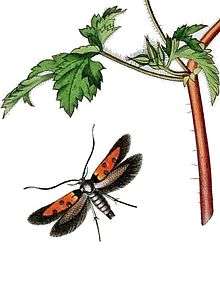Agonoxeninae
| Agonoxeninae | |
|---|---|
 | |
| Chrysoclista linneella | |
| Scientific classification | |
| Kingdom: | Animalia |
| Phylum: | Arthropoda |
| Class: | Insecta |
| Order: | Lepidoptera |
| Suborder: | Glossata |
| Infraorder: | Heteroneura |
| Division: | Ditrysia |
| Superfamily: | Gelechioidea |
| Family: | Elachistidae Meyrick, 1926 |
| Subfamily: | Agonoxeninae (disputed) |
| Synonyms | |
|
Agonoxenidae | |
The Agonoxeninae are a subfamily of moths.
History of classification
Formerly, the subfamily only contained four named species – all in the type genus Agonoxena – if (e.g. following Nielsen et al., 1996). Such a monotypic arrangement is fairly unusual in modern taxonomy without explicit need due to phylogenetic constraints.
Hodges (in Kristensen, 1999) retained the Blastodacnidae in the Agonoxenidae, giving a grouping of some 31 genera, and treating the whole as a subfamily Agonoxeninae of the grass-miner moths (Elachistidae). Collectively, the Agonoxenidae and "Blastodacnidae" are known as palm moths.
Genera
- Agonoxena Meyrick, 1921
- Asymphorodes (formerly in Cosmopterigidae)
- Cladobrostis
- Diacholotis
- Gnamptonoma
- Helcanthica
- Ischnopsis
- Nanodacna
- Nicanthes
- Pammeces Zeller, 1863 (formerly in Cosmopterigidae)
- Pauroptila
- Porotica
- Proterocosma (formerly in Cosmopterigidae)
Former genera
Blastodacna, Dystebenna, Haplochrois, Heinemannia and Spuleria are sometimes placed here, sometimes in the Elachistidae (or Blastodacnidae).
Other genera formerly placed here:
References
- Nielsen E.S., Edwards E.D. & Rangsi T.V. (eds.) (1996), Checklist of the Lepidoptera of Australia; Monographs on Australian Lepidoptera Volume 4; CSIRO Publishing, Melbourne, 1996
- Kristensen, N.P. (ed.), 1999. Handbook of Zoology: Bd. 4. Arthropoda: Insecta. Teilbd. 35, Lepidoptera, moths and butterflies. Vol. 1. Evolution, systematics, and biogeography. W.de Gruyter, Berlin.